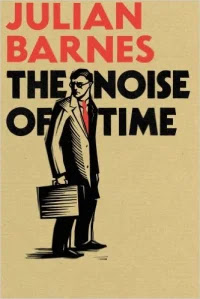Julian Barnes's The Noise of Time
Julian Barnes' novel 'The Noise of Time' is a fictionalized account of the life of Dmitri Shostakovich, one of the most famous Russian composers of the twentieth century. At twelve-year intervals, the novel focuses on three key points in his life. During the height of the purges in 1936, Shostakovich is waiting by a lift shaft for the secret police to take him away and interrogate him at The Big House. In the second part, he travels to America in 1948 to deliver a speech on behalf of the Soviet Union. In the final episode, set in 1960, he is asked to join the Communist Party under Khrushchev.
You don't have to be an expert on Shostakovich's life to read and enjoy this novel. It is less about the struggles of one composer and more about how creativity is guided by circumstances and the power of art and music under difficult and restricted conditions in a totalitarian state. The absurd contradictions of Soviet life are evident throughout the book, which is frequently laced with black humour. Shostakovich's music was banned after Stalin condemned his early opera 'Lady Macbeth of Mtsensk,' calling it "muddle instead of music" in an editorial in Pravda. However, when he is asked to represent the Soviet Union at the Cultural and Scientific Conference for World Peace in New York in 1948, he discovers that his reputation has been instantly restored, with Stalin even claiming that his music was never banned in the first place.
XEM THÊM :
Mách anh em mẹo chơi ✔️ Bầu cua online ✔️ Hiệu quả số 1
Barnes' first novel since one of his more conventional works, The Sense of an Ending, was published in 2011 and won the Man Booker Prize that year, a literary award he famously described as "posh bingo." Barnes is no stranger to retelling true stories, such as the affair between balloonist Colonel Fred Burnaby and French actress Sarah Bernhardt in Levels of Life or the Great Wyrley Outrages case in Arthur and George.
Barnes, like both of these accounts, does not break away far from the known facts about Shostakovich, but he does succeed in bringing real life to his character, one that he clearly sympathizes with.
Those who have read Barnes' previous novels will be familiar with his particular fondness for writing fragmented, often abstract lists of memories and snapshots rather than conventional prose. In this regard, 'The Noise of Time' is no exception, and I can see how Barnes' writing may be off-putting to some readers. 'The Noise of Time,' on the other hand, is an atmospheric portrait of an intriguing character that could be a Man Booker Prize contender later this year.
Thank you to Random House UK, Vintage Publishing, and Jonathan Cape for providing me with a review copy of 'The Noise of Time' via NetGalley.
READ ARTICLES:




Comments
Post a Comment